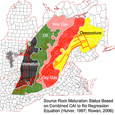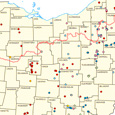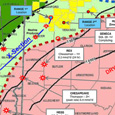Marcellus and Utica shale: Pa. royalty legislation moves forward
Thursday, April 3, 2014
HARRISBURG, Pa. — As Pennsylvania landowners receive shale oil and gas royalty checks — and are being disappointed by charges they knew nothing about when they signed their lease — legislators are working to determine exactly what a minimum royalty payment means.
State legislation that seeks to clarify a minimum royalty payment was reported out of the House Environmental Resources and Energy Committee March 17 by a 15-10 vote, according to state Rep. Garth Everett, who sponsored the bill.
To full House
The measure, which was the subject of hours of discussion during two committee meetings, will now advance to the full House for its consideration.
The legislation, Pennsylvania House Bill 1684, is designed to address concerns by landowners whose royalty payments have decreased due to post-production costs.
Skimpy royalties
As has been reported, some energy companies attempted to reduce or succeeded in reducing royalties below the statutory minimum by transferring post-production costs to royalty owners. These are costs that are incurred between the wellhead and a final market point of sale and typically include dehydration and transportation.
When these expenses are deducted, final payments often result in royalty shares of less than one-eighth, which is equivalent to about 12.5 percent.
“I am pleased that we got the bill moved out of committee and now hope to get it to the House floor for a full debate and vote,” Everett said. “The committee and amendment process made this a better, more focused bill.”
Minimum royalties?
Although a 1979 state law guarantees a minimum royalty to landowners of one-eighth, or 12.5 percent, language was not clear for unconventional wells, namely those in the Marcellus shale.
In addition, the law did not specify terms such as “post-production costs.” As a result, the state Supreme Court determined that the General Assembly needed to define those terms in order to clarify the law for the drilling activity that is currently taking place.
Post-production costs
The legislation also includes an amendment to more clearly define post-production costs and to specify that the proposal would apply to both existing and future leases.
“Minimum royalty payment amounts has become an overriding issue for many landowners in the Northern Tier,” said Rep. Sandra Major. “My colleagues and I from the region have been diligently working on and advocating for greater clarification for some time now, and it is gratifying to have the bill garner committee support and move on to the full House for consideration.”
House Bill 1684 could come up for a House vote on second consideration, where additional amendments could be considered in the next couple of weeks.




